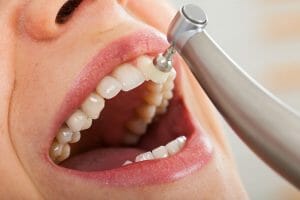5 Reasons for Jaw Pain

Jaw pain can be an uncomfortable or even grueling experience. The pain can be just present enough to catch your attention or severe enough to disrupt your day.
So what causes jaw pain, when should you do something about it, and what are some of your treatment options?
In this blog, we’ll explore the five reasons for jaw pain.
What are the common causes of jaw pain?
When it comes to the dental-related causes of jaw pain, we at O’Connor Dental Care have identified five main causes:
1. TMJ Disorders (TMD)
TMJ, or the temporomandibular joint, connects the jaw to the skull and operates like a sliding hinge.
TMJ Disorders, or TMD, are common and can cause pain in the muscles that control the jaw. Some of the reasons we find at our clinic that a patient has TMD include:
- A jaw injury
- Arthritis
- TMJ’s shock-absorbing disk is eroded or unaligned
It’s important to treat TMD once you’re diagnosed. While it isn’t always clear what the specific cause of TMD is, it has been linked to various ailments. Jaw injury, chronic teeth grinding, arthritis, and toothaches are all possibilities.
If the cause of your jaw pain is TMD, there are several courses of action your dentist can take, including:
- A course of antibiotics, anti-inflammatory drugs or muscle relaxants
- Root canal therapy or tooth extraction
- Jaw massage and exercises
- Mouth guards or oral splints
- Surgery, but only as a last resort
The precise nature of your treatment for TMD will depend on your examination and what the cause is. We can narrow down on what’s causing your TMD by observing your jaw as you open and close your mouth and dental X-rays.
2. Bruxism
Teeth grinding, called Bruxism in dentistry, is a condition in which you grind, clench, or gnash your teeth. You may have Bruxism if you find that you awaken to jaw pain, toothaches, and headaches.
People typically experience one of two types of Bruxism. Awake Bruxism is when you grind, gnash, and clench your teeth while conscious. You may do this because of stress, tension, or bad habits. Sleep Bruxism occurs while you’re unconscious and unknowingly engaged in chewing activities.
There are many causes of Bruxism, including:
- Emotional extremes, such as anger, frustration, fear
- Age, as it’s more common in childhood
- Genetics
- A side effect from prescribed medications
- A result of caffeine, alcohol, or recreational drug abuse
Mild cases of Bruxism often do not need treatment. However, if Bruxism is severe enough to cause jaw pain, your dentist may recommend:
- Medications, such as prescriptions for anxiety, Botox treatments, or muscle relaxers
- Behavior modifications, such as jaw exercises
- Mouthguards and splints for the upper or lower jaw
- Crowns or other dental restoratives, in extreme cases
Your dentist will be able to help determine if Bruxism is the cause of your jaw pain by asking you questions related to your sleeping habits, medications you take, and examining your teeth for obvious signs of damage.
Periodontitis is gum disease that causes a severe infection of the gums and requires immediate dental care. Regular teeth brushings, flossing, and dental checkups can prevent this common disorder.
Some of the causes of Periodontitis include:
- Plaque forming on the teeth and under the gumline
- Prevalent gum inflammation
- Poor oral health
Gingivitis is the mildest form of Periodontitis and causes gum inflammation and irritation. If you’ve developed gum inflammation and irritation, be sure to visit your dental professional. Gingivitis can be reversed, while full-blown Periodontitis is more tricky to heal.
If your dentist diagnoses you as having Periodontitis, treatment options may include:
- Scaling, to remove tartar buildup
- Antibiotics, to reduce infections
- Root planing to diminish roots and tartar buildup
- Soft tissue and/or bone grafting surgeries
- Tissue-stimulating protein gel application
- Flap surgery to reduce gum pockets
- Guided tissue regeneration to rebuild bone
To determine the presence and treatment options of Periodontitis, your dentist will examine your mouth, review your dental history, take X-rays, and measure gum pockets.
4. Cavities
Cavities are a common tooth ailment for people of all ages. The problem with cavities is that by the time you realize you have one, dental treatment is already needed. Cavities are holes in your tooth or teeth that result from decay.
Cavities are typically caused by:
- Poor oral health
- Consumption of sugary foods and drinks
- Dry mouth
- Ingesting foods and drinks that are acidic
- Bulimia or anorexia
- Acid reflux disease
Your dentist will be able to quickly detect if you have a cavity with a simple oral examination. If a cavity is the cause of your jaw pain, you can expect treatments like:
- A fluoride treatment, if the early stages of a cavity
- Tooth fillings
- Root canals
The precise treatment will depend on how advanced your cavity is. Not treating a cavity can lead to serious infections, such as abscesses. It’s important to contact your dentist if you suspect you have a cavity.
5. Wisdom teeth growth
If you have jaw pain and are between the ages of about 17 and 25, the growth of wisdom teeth may be the culprit.
Wisdom teeth are the upper and lower molars and the last set of teeth we develop. Jaw pain associated with wisdom teeth occurs as wisdom teeth develop or after a dental extraction.
Common treatments for jaw pain due to wisdom teeth include:
- Extracting the tooth or teeth
- Rinsing with saltwater, post removal
- Taking pain medication
- Applying a cold compress
Your dentist will give you specific instructions on how to relieve your jaw pain due to wisdom teeth growth.
Can O’Connor Dental Care treat my jaw pain?
Absolutely! Treating jaw pain is a common practice in our dental clinic. If you’re experiencing jaw pain, don’t wait. Contact us today and find out how we can relieve your pain, fast.











